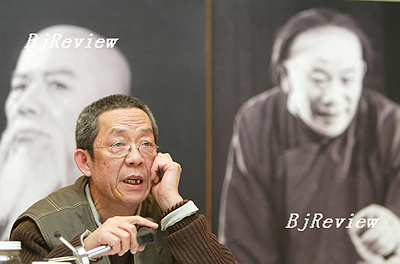
As one of China's most renowned play directors, Lin Zhaohua once worked as the deputy director of Beijing People's Art Theater, the longest-standing drama group in China. The prolific drama studio that Lin set up in 1989 and has been supervising ever since, has produced more than 60 dramas, including a number of repertoire.
Lin made a name for blending the visual beauty of traditional dramas with modern plays. His works have achieved dramatic art world and box office success.
Now 71 years old, Lin still launches several new plays every year. Drama groups from Germany and Japan have extended invitations for him to direct plays for them.
"I will keep on directing plays as long as I can move. And I will be in the audience seats when I am too old to move," Lin once said.
I have never been into fancy things. I cannot understand why people are baffled by plays about real life.
Today play artists always talk about selling points and box office performance, whether they are big theater productions or small theater productions. I think now stage lacks the "drama spirit."
As far as I am concerned, the "drama spirit" refers to unremitting efforts, never yielding and determined innovation. A new model, immature it may be, shows a new world to the audience. This is what gives plays their never-declining vitality.
But I am not saying that every play director should create a brand new genre of plays. After all, it is not easy to do so for a single person.
I have been directing plays for many years and during this period I have kept asking myself whether plays evolve according to certain principles. I still haven't found the answer. I keep on moving forward, doing whatever I like, regardless of philosophy and theories.
It is a very Chinese practice to promote the experience in artistic creation. Actually, I don't think people should be encouraged to follow one particular example. Instead, artists should always be encouraged to break existing models. We now badly need play rebels against tradition. Even in inheriting traditions, we should always hold a suspicious attitude and find our own stand over the process.
To be frank, as a director I am devastated if only a few dozen people come to watch my plays. However, I believe we should always let the audience choose plays, rather than the other way round.
Ever since the early 1990s, Meng Jinghui has been one of the most controversial figures of Chinese theater. With highly experimental, yet immensely popular productions, the avant-garde director has built a stable audience.
Meng's on-stage exploits have stirred up a storm of Chinese "experimental drama" in recent years. So much so that his name has become synonymous with "alternative" theater. In spite of his unorthodoxy, Meng's plays have met great success in small theaters across Beijing. Meng's works, each more stunning than the last, all bear the mark of a Meng-style passion about life, rebellion, humor and satire. His achievements have earned him the reputation of being both popular and avant-garde, a rare feat in the world of art.
I think it is unnecessary to give "experimental drama" a definition. Actually, every play director should take an "experimental" approach, which will create an innovative ambience.
Chinese play arts developed very fast in the 1980s. In the 1990s some play directors started to express their personality in plays. As for myself, I believed my breakthrough would be in redesigning stage art by rebelling against existing rules. At that time, I felt that I bore the responsibility to innovate in my plays.
Back in university, I studied literature. I remembered that I was struck by the sudden exposure to surrealism and magic realism that originated from Western countries. Until then, we had been greatly influenced by revolutionary romanticism from the Soviet Union. We were all of a sudden in great confusion.
I believe there is a huge gap between realism and real life. I believe that as an important creation principle realism has covered a lot of things. However, some play directors have misunderstood realism as putting everyday life on the stage without any creativity or imagination. I am totally against it. I believe an artist should guide the public rather than be guided by the public.
I always seek tools from China's traditional aesthetics. I understand the destructive part of my work is done out of instinct. Meanwhile, I have been thinking perhaps I should build some things to replace the things I have destroyed. This is what is on my mind recently.
As one of the most innovative of contemporary Chinese dramatists, Wei Minglun's knowledge and grip of the Chinese operatic stage are legendary. In Pan Jinlian, a drama written in 1985, Wei brought people of different times and cultures together and provided them with a common forum for discourse. The play was so successful that it was rewritten into dozens of different folk dramas and played by over 200 drama troupes. He triggered a debate on bias against women in China's ancient society that has been echoed in Hong Kong, Taiwan and even abroad.
| 